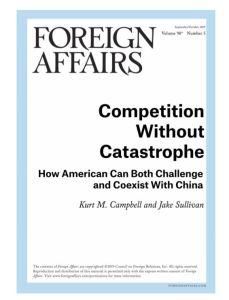Join getAbstract to access the summary!

Join getAbstract to access the summary!
Kurt M. Campbell and Jake Sullivan
Competition Without Catastrophe
How America Can Both Challenge and Coexist with China
Foreign Affairs, 2019
What's inside?
The United States must pursue a policy of “clear-eyed coexistence” with China.
Recommendation
The US-China relationship has evolved from “engagement” to what the US government’s 2018 National Security Strategy now refers to as “strategic competition.” The form and goals of such a competition remain unclear, however. Is it analogous to the Cold War relationship between America and the former Soviet Union? Veteran US foreign policy officials Kurt M. Campbell and Jake Sullivan lay out their vision for a sensible US-China strategy. They offer a clear and practical analysis of what the United States can – and can’t – expect to achieve in its interactions with the emerging superpower.
Summary
About the Authors
Kurt M. Campbell is Chair and CEO of the Asia Group. He served as US Assistant Secretary of State for East Asian and Pacific Affairs from 2009 to 2013. Jake Sullivan is a Nonresident Senior Fellow at the Carnegie Endowment for International Peace and was Director of Policy Planning at the US Department of State in 2011–13.


















Comment on this summary